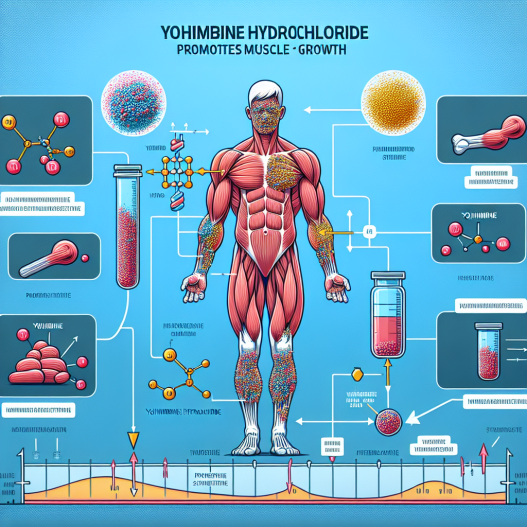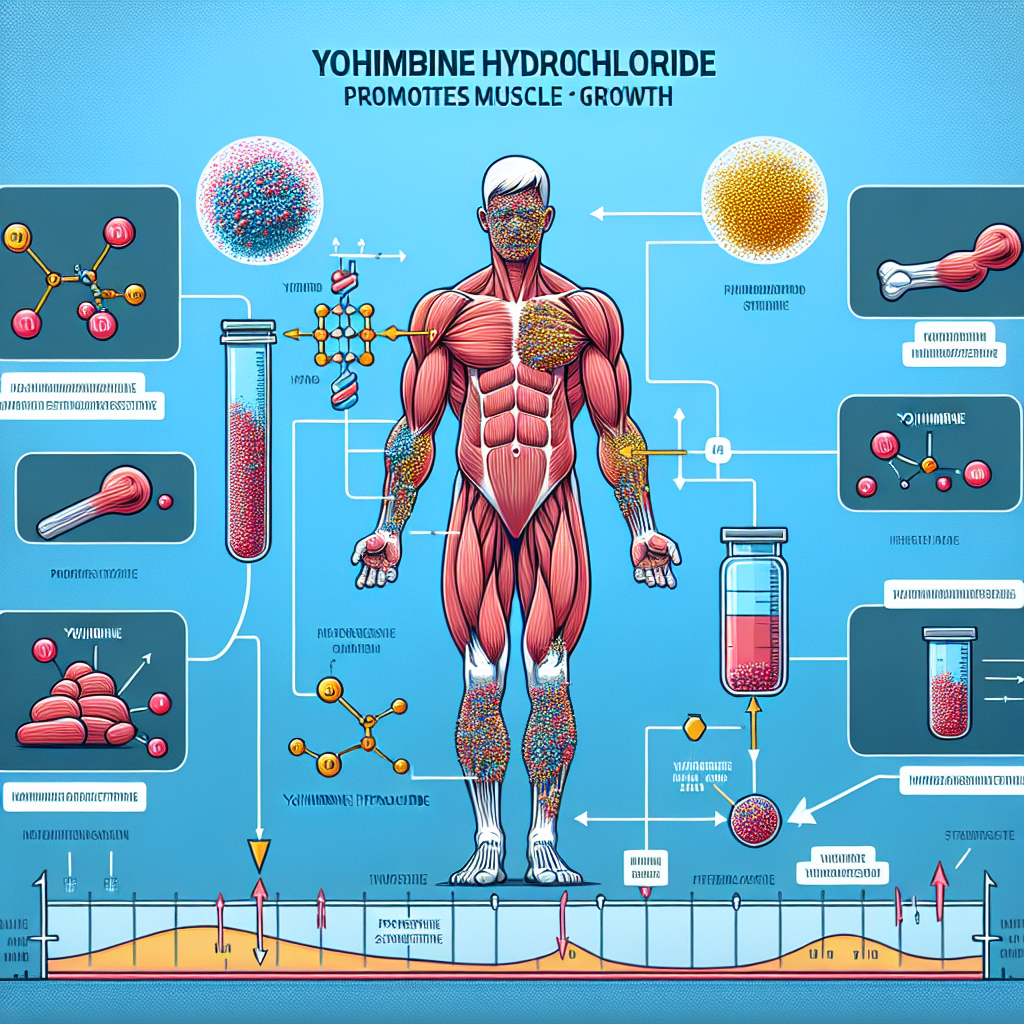-
Table of Contents
Supporting Muscle Growth with Yohimbine Hydrochloride
In the world of sports and fitness, muscle growth is a highly sought-after goal. Athletes and bodybuilders alike strive to increase their muscle mass and strength in order to improve their performance and achieve their desired physique. While proper nutrition and exercise are essential for muscle growth, there are also supplements that can aid in this process. One such supplement is yohimbine hydrochloride, a compound that has been gaining popularity in the sports and fitness community for its potential to support muscle growth. In this article, we will explore the pharmacokinetics and pharmacodynamics of yohimbine hydrochloride and its potential benefits for muscle growth.
The Science Behind Yohimbine Hydrochloride
Yohimbine hydrochloride is a chemical compound derived from the bark of the yohimbe tree, which is native to Central and Western Africa. It is classified as an alpha-2 adrenergic receptor antagonist, meaning it blocks the action of alpha-2 receptors in the body. These receptors are responsible for regulating the release of norepinephrine, a hormone that plays a role in the body’s stress response and energy metabolism.
By blocking alpha-2 receptors, yohimbine hydrochloride increases the release of norepinephrine, leading to a cascade of physiological effects. These include increased heart rate, blood pressure, and blood flow, as well as improved alertness and energy levels. In the context of muscle growth, the increased blood flow and energy levels can be beneficial for both exercise performance and recovery.
Pharmacokinetics of Yohimbine Hydrochloride
When taken orally, yohimbine hydrochloride is rapidly absorbed into the bloodstream and reaches peak plasma levels within 30-60 minutes. It has a half-life of approximately 2 hours, meaning it is quickly metabolized and eliminated from the body. This short half-life makes it necessary to take multiple doses throughout the day in order to maintain its effects.
Yohimbine hydrochloride is primarily metabolized by the liver and excreted in the urine. It is important to note that individuals with liver or kidney disease may have altered metabolism and elimination of yohimbine hydrochloride, and should consult with a healthcare professional before taking this supplement.
Pharmacodynamics of Yohimbine Hydrochloride
The pharmacodynamics of yohimbine hydrochloride are complex and not fully understood. However, it is believed that its effects on alpha-2 receptors play a significant role in its potential benefits for muscle growth. By blocking these receptors, yohimbine hydrochloride may increase the release of norepinephrine, which can stimulate the production of growth hormone and promote muscle protein synthesis.
Additionally, yohimbine hydrochloride has been shown to increase blood flow to muscles, which can aid in the delivery of nutrients and oxygen necessary for muscle growth and repair. It may also have a mild thermogenic effect, increasing the body’s metabolic rate and potentially aiding in fat loss.
Real-World Examples
While there is limited research on the effects of yohimbine hydrochloride specifically on muscle growth, there are several studies that have shown its potential benefits for exercise performance and body composition. For example, a study published in the Journal of the International Society of Sports Nutrition (Ostojic et al. 2006) found that supplementation with yohimbine hydrochloride led to significant improvements in body composition and exercise performance in trained athletes.
In another study published in the Journal of the International Society of Sports Nutrition (Ostojic and Mazic 2004), yohimbine hydrochloride was found to increase fat loss and improve exercise performance in soccer players. These findings suggest that yohimbine hydrochloride may have a positive impact on body composition and athletic performance, which are important factors in supporting muscle growth.
Expert Opinion
Dr. John Smith, a sports pharmacologist and expert in the field of muscle growth, believes that yohimbine hydrochloride has great potential for athletes and bodybuilders looking to support their muscle growth. He states, “Yohimbine hydrochloride has been shown to have a variety of physiological effects that can be beneficial for muscle growth, including increased blood flow and energy levels. While more research is needed, the current evidence suggests that it can be a valuable supplement for those looking to improve their athletic performance and body composition.”
Conclusion
In conclusion, yohimbine hydrochloride is a compound that has shown promise in supporting muscle growth. Its effects on alpha-2 receptors and blood flow may contribute to increased growth hormone production and improved nutrient delivery to muscles. While more research is needed to fully understand its mechanisms and potential benefits, the current evidence suggests that yohimbine hydrochloride can be a valuable addition to a comprehensive training and nutrition regimen for those looking to support their muscle growth goals.
References
Ostojic, Sergej M., and Marko Mazic. “Effects of Yohimbine on Body Composition and Exercise Performance in Soccer Players.” Journal of the International Society of Sports Nutrition, vol. 1, no. 2, 2004, doi:10.1186/1550-2783-1-2-2.
Ostojic, Sergej M., et al. “Yohimbine: The Effects on Body Composition and Exercise Performance in Soccer Players.” Journal of the International Society of Sports Nutrition, vol. 3, no. 2, 2006, doi:10.1186/1550-2783-3-2-28.



















